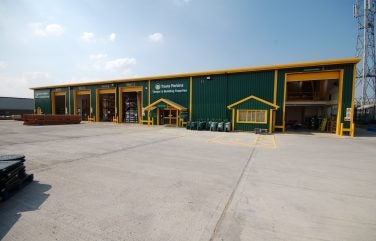
Reduced demand and price deflation has led to national builders merchanting chain Travis Perkins recording one of its poorest set of annual results in many years.
Travis Perkins plc reported that 2024 was a “challenging year”, with revenue of £4.607bn – down 4.7% year-on-year, due to price deflation, reduced construction sector demand, and increased competitive intensity.
The challenging trading conditions were reflected in profitability levels, with Travis Perkins recording a loss after tax of £77m, a 300% dip from the £38m after tax profit posted a year ago. Operating profit was £2m (2023: £161m) and adjusted operating profit was £152m (2023: £198m).
The Group has experienced a mixed start to 2025. Trading conditions have continued to be challenging in its merchanting businesses with pricing now stabilised but volumes in modest decline.
Geoff Drabble, Travis Perkins Chair, said it was clear the business needed to refocus in a number of areas and change the way it operates to better serve customers and support suppliers. Work has already been taking place to address this but will now continue at pace.
Company CEO Pete Redfern has resigned due to ill-health, and a search for his successor has started.
“Whilst uncertainty remains regarding the strength and timing of a recovery in UK construction activity, with more resources re-deployed into customer-facing roles, the Group is now better placed to benefit from returning demand,” said Mr Drabble.
“This will be supported by disciplined capital allocation, focused on upgrading and protecting our core competitive advantages, and a clear customer-focused strategy owned by the leaders of the business.”
Against this backdrop management took actions in 2024 to reduce total overheads by £53m compared to the prior year.
The Group’s Merchanting businesses saw revenue fall by 6.2% in the year to £3.786bn, with adjusted operating profit down 29.7% to £149m (2023: £212m). Adjusting items of £133m were recorded relating to impairments in Staircraft and certain merchanting branches and restructuring actions.
Price deflation, a significant factor in H1 due to the rollover of prior year timber price reductions in particular, eased in H2. However, volumes worsened as the year progressed, in part driven by project postponements caused by general election uncertainty and the delayed government budget.
The private domestic RMI market, the Merchanting segment’s largest end market which is primarily serviced by the Group’s General Merchant business, remained depressed throughout the year. The private domestic new-build market, primarily serviced by Keyline and CCF working with national and regional housebuilders, also saw another notable drop in activity.
Toolstation performed better, continuing to deliver good growth. Its revenues rose 2.5% in 2024 to £812m, with adjusted UK operating profit up 4&% to £34m.
“It is encouraging to see a more robust demand backdrop for some elements of the construction market,”, the company said.
“However, the pace and rate of an overall recovery in construction activity levels remains uncertain and will likely need further cuts to interest rates and an uplift to consumer confidence levels to stimulate a meaningful increase in demand.”






